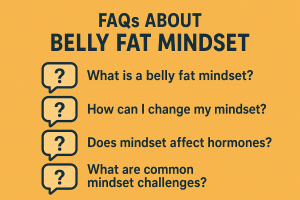🧘♀️ Belly Fat Mindset: Transform Your Hormones and Thinking to Finally Lose Stubborn Fat
Introduction to the Belly Fat Mindset

The Belly Fat Mindset is not just about cutting calories or exercising harder—it’s about transforming the way you think, feel, and respond to stress. Most people believe belly fat is a simple result of overeating, but research shows that mindset and hormones are deeply intertwined. Your thoughts affect your stress response, which in turn influences your hormones, appetite, and fat storage patterns.
When your mind operates in a state of constant stress, your body releases cortisol—the primary stress hormone. High cortisol levels tell your body to store more fat, especially around your midsection, where it can be easily accessed for “emergencies.” This creates the classic cycle: stress → belly fat → frustration → more stress. Breaking this cycle begins with reprogramming your mindset.
The Psychology Behind Belly Fat
How Stress and Cortisol Trigger Belly Fat Storage
When you’re anxious, your brain signals your adrenal glands to release cortisol. Elevated cortisol increases blood sugar levels, suppresses digestion, and promotes fat storage around the belly. Chronic stress keeps cortisol high, making it nearly impossible to lose fat—even with a clean diet. Managing your emotional state becomes as crucial as managing calories.
Emotional Eating and the Role of Dopamine
Emotional eating is a dopamine-driven behavior. Dopamine, the “feel-good” neurotransmitter, spikes when we eat comfort foods—especially those rich in sugar and fat. The problem? These foods only provide temporary relief. Over time, your brain links emotional comfort with eating, making fat loss harder unless you retrain your response to emotions.
Why Mindset Shifts Are More Powerful Than Diets
Diet plans often fail because they don’t address mindset. A “belly fat mindset” involves adopting beliefs that promote patience, self-compassion, and long-term consistency. Sustainable fat loss happens when your habits are aligned with a calm, confident mindset—not when you’re fighting your body out of guilt or frustration.
Hormones That Influence Belly Fat
Cortisol: The “Stress Hormone” Sabotaging Your Waistline
Cortisol is the biggest hormonal contributor to belly fat. It raises blood sugar, increases cravings for high-energy foods, and signals your body to store fat in your abdominal area. Chronic stress—from work, relationships, or lack of sleep—keeps cortisol elevated and belly fat persistent.
Insulin and Blood Sugar Imbalances
When your diet is high in refined carbs, insulin levels stay elevated. Insulin’s job is to shuttle glucose into cells, but when overproduced, it leads to fat storage. Managing insulin through mindful eating and balanced nutrition can dramatically reduce abdominal fat.
Estrogen, Testosterone, and Midlife Weight Gain
Hormonal shifts during perimenopause or andropause often lead to stubborn belly fat. Declining estrogen or testosterone can slow metabolism and change fat distribution. Balancing these hormones naturally—through proper sleep, nutrition, and stress reduction—can help restore hormonal harmony.
Leptin and Ghrelin: Your Hunger and Fullness Messengers
Leptin signals fullness; ghrelin signals hunger. Chronic dieting disrupts both, making you feel hungry even when you’ve eaten enough. Rebuilding trust between your body and brain is key to resetting these hunger hormones.
Reprogramming the Belly Fat Mindset
Step 1: Building Awareness Around Triggers
Start by identifying what triggers emotional eating or stress responses. Journaling, mindfulness, and self-reflection can help you recognize patterns that lead to overeating.
Step 2: Practicing Mindful Eating and Emotional Regulation
Mindful eating means slowing down, savoring each bite, and listening to your body’s signals. Pair this with emotional regulation techniques—like breathwork, meditation, or gentle movement—to prevent stress-driven cravings.
Step 3: Using Affirmations and Visualization to Rewire Beliefs
Visualization rewires your subconscious beliefs. Imagine your healthiest self daily—calm, energetic, and confident. Affirmations like “I trust my body’s natural wisdom” help replace self-doubt with empowerment.
💡 External Resource:
For a deeper dive into the relationship between stress, hormones, and fat storage, visit Harvard Health’s guide on stress and metabolism.
Lifestyle Habits That Support Hormonal Balance
Sleep, Recovery, and Cortisol Control
Sleep is not a luxury—it’s your body’s most powerful hormone regulator. When you sleep less than 7 hours, cortisol spikes while leptin (the fullness hormone) drops. This double whammy makes you hungrier, slows fat burning, and increases belly fat storage. Prioritize a consistent bedtime, reduce blue light exposure, and keep your room cool and dark.
A simple rule: “Sleep more to weigh less.” Quality rest allows your body to repair, balance hormones, and process emotions that might otherwise trigger emotional eating.
Exercise and Its Role in Hormonal Optimization
You don’t need hours of cardio to lose belly fat. In fact, over-exercising can raise cortisol. Instead, combine strength training (to increase muscle and metabolism) with low-intensity movement (like walking or yoga) to lower stress hormones.
High-Intensity Interval Training (HIIT) in moderation can also boost growth hormone and testosterone—two powerful fat-burning allies. The key is balance: move often, but rest deeply.
Nutrition Strategies for a Balanced Mind and Body
Nutrition affects both mindset and hormones. Focus on whole foods—lean proteins, healthy fats, and fiber-rich carbs. Minimize sugar and refined grains to stabilize insulin.
Include foods that support hormone balance:
-
Avocados for healthy fats
-
Leafy greens for magnesium (reduces cortisol)
-
Wild salmon for omega-3s (reduces inflammation)
-
Fermented foods like yogurt and kimchi for gut health (affects serotonin and mood)
Hydration also matters. Dehydration can elevate cortisol and slow metabolism. Aim for at least 8 glasses of water daily.
The Science of Mind-Body Connection in Fat Loss
Neuroplasticity and Habit Formation
Your brain is constantly rewiring itself—a phenomenon known as neuroplasticity. Every thought you repeat strengthens a neural pathway. If you constantly think, “I can’t Lose Weight,” your brain reinforces that belief. But if you shift to, “I am becoming leaner and healthier every day,” you activate new circuits that support motivation and action.
Creating a new “belly fat mindset” means aligning your inner dialogue with your goals. Visualization, journaling, and gratitude are powerful tools to reshape your neural blueprint.
How Positive Thinking Impacts Metabolism
Studies show that optimism lowers stress hormones, enhances immune function, and even boosts metabolic rate. When you think positively, your body produces more serotonin and dopamine, leading to better decision-making around food and movement.
In short, your thoughts can either fatten or flatten your belly—because your mindset literally instructs your hormones how to behave.
Real-Life Case Studies and Transformations
Meet Elena, a 42-year-old mother of two who struggled with belly fat for years despite dieting. After shifting her mindset—focusing on stress management, self-compassion, and hormone-friendly habits—she lost 18 pounds in six months.
Or Mark, a busy executive, who learned to meditate before meals. This single habit helped him eat slower, reduce emotional eating, and balance his cortisol levels—leading to noticeable fat loss without extreme workouts.
Their success wasn’t just about food; it was about finally aligning their thoughts, hormones, and habits.
Common Myths About Belly Fat and Mindset

“You Just Need to Eat Less and Move More” — The Oversimplified Lie
This old fitness mantra ignores hormonal and psychological complexity. For many, especially women over 35, hormonal imbalances and chronic stress play a greater role than calories alone. Without addressing cortisol, insulin, and mindset, most diets fail long-term.
“Hormones Don’t Affect Weight Loss” — Debunked
Science proves otherwise. Cortisol, insulin, leptin, estrogen, and thyroid hormones all influence how your body stores or burns fat. Ignoring hormones is like trying to drive a car without fuel—it simply won’t go anywhere.
FAQs About Belly Fat Mindset
1️⃣ Can mindset alone reduce belly fat?
Mindset alone doesn’t burn fat—but it sets the foundation for consistent habits that do. A positive, calm mindset lowers cortisol and improves decision-making, which directly supports fat loss.
2️⃣ What are the best mindset techniques for fat loss?
Mindful eating, visualization, gratitude journaling, and daily affirmations. For example, repeat: “My body knows how to find its natural balance.”
3️⃣ How do hormones affect fat storage?
Hormones like cortisol and insulin dictate whether your body stores fat or burns it. When they’re balanced, your metabolism functions optimally.
4️⃣ Can stress management help reduce belly fat?
Absolutely. Lowering stress reduces cortisol, which directly minimizes abdominal fat storage.
5️⃣ What foods help balance hormones naturally?
Avocados, nuts, seeds, leafy greens, salmon, and probiotics all support hormonal health and gut balance.
6️⃣ How long does it take to reset your belly fat mindset?
Typically 30–90 days of consistent mental and lifestyle practices create noticeable mindset and body changes.
Conclusion: Redefining Your Relationship with Food, Body, and Mind
The Belly Fat Mindset isn’t about restriction—it’s about liberation. When you understand the link between your thoughts, hormones, and habits, you regain control of your body and your confidence.
Fat loss becomes effortless when your mind and hormones work with you, not against you. By cultivating awareness, practicing self-compassion, and nourishing your body intelligently, you create the internal environment where transformation naturally happens.
Your belly fat isn’t your enemy—it’s a messenger, urging you to slow down, balance your emotions, and reconnect with your body’s innate wisdom. The moment you shift your mindset, your hormones—and your waistline—follow.